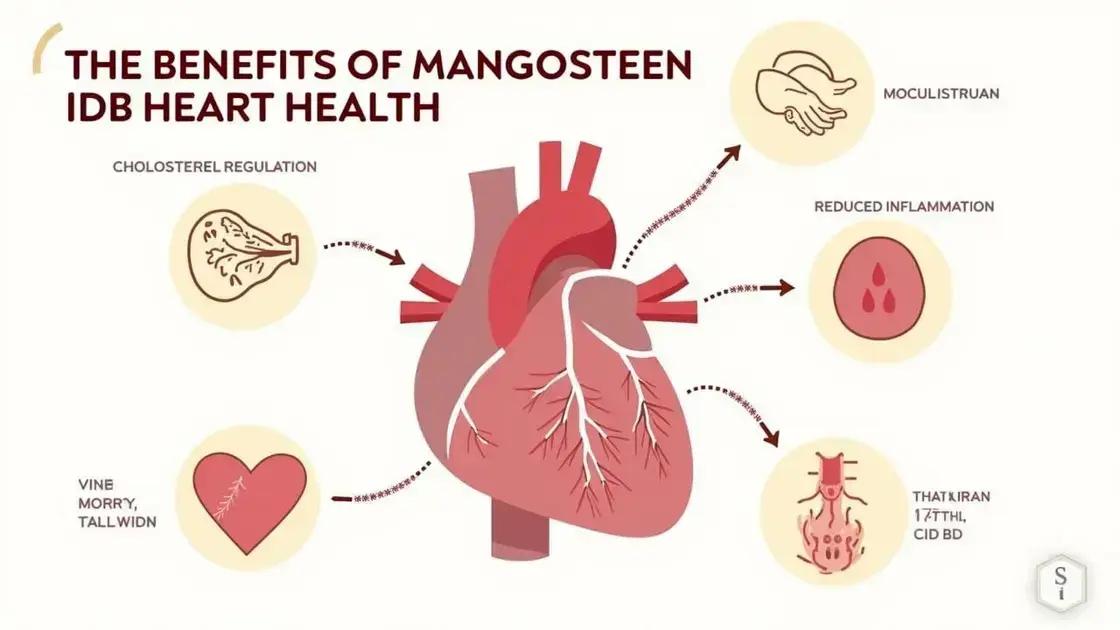The connection between mangosteen and cardiovascular wellness is highlighted by its rich antioxidant content, anti-inflammatory properties, and potential to regulate cholesterol and blood pressure, making it a beneficial addition to a heart-healthy diet.
Mangosteen, often hailed as the “queen of fruits,” plays a significant role in cardiovascular wellness. This tropical fruit is not only delicious but packed with nutrients that can enhance heart health. In this article, we will dive into the benefits of mangosteen, focusing on how it contributes to cardiovascular health and overall well-being. Join us as we uncover the science behind this amazing fruit.
Understanding Mangosteen: A Brief Overview

Mangosteen is a tropical fruit known for its sweet and tangy flavor. It originates from Southeast Asia and has been cherished for centuries for its unique taste and numerous health benefits. The fruit is about the size of a medium-sized orange and has a thick purple rind with juicy white segments inside.
Key Features of Mangosteen
The outer rind of the mangosteen is not edible, but the inner fruit is quite delightful. Rich in vitamins, minerals, and antioxidants, mangosteen is often considered a superfood. The most notable component in the fruit is xanthones, which are powerful antioxidants that can help fight inflammation and promote overall health.
Historical Significance
Historically, mangosteen has been used in traditional medicine by various cultures. It has been known to help with ailments ranging from skin conditions to digestive issues. The fruit’s healing properties have made it a staple in many indigenous practices.
Growth and Cultivation
Mangosteen trees thrive in tropical climates and require specific growing conditions. These trees need plenty of rainfall and well-drained soil to flourish. The fruit usually takes a few years to mature after planting, which adds to its value and rarity in some regions.
Popular Uses
In addition to being eaten fresh, mangosteen is often incorporated into juices, smoothies, and dietary supplements. It’s gaining popularity in wellness circles for its potential health benefits, especially related to heart health.
Nutritional Benefits of Mangosteen

Nutritional benefits of mangosteen are impressive and significant, making it a valuable addition to a healthy diet. This tropical fruit is low in calories, making it a great option for those looking to maintain a healthy weight.
Vitamins
Mangosteen is rich in essential vitamins, particularly Vitamin C, which supports immune function and helps the body fight infections. Additionally, it contains small amounts of Vitamin A, which is important for vision and skin health.
Minerals
This fruit also provides vital minerals such as potassium and magnesium. Potassium helps regulate blood pressure, while magnesium is essential for muscle function and overall heart health.
Antioxidants
Mangosteen is well-known for its high antioxidant content due to the presence of xanthones. These powerful compounds help combat oxidative stress, which can lead to chronic diseases.
Dietary Fiber
Furthermore, mangosteen contains dietary fiber that is beneficial for digestive health. Fiber aids in digestion and can help lower cholesterol levels, contributing to cardiovascular wellness.
Potential Health Benefits
The combination of vitamins, minerals, and antioxidants found in mangosteen may support overall health. Regularly including this fruit in your diet could potentially enhance your body’s defense mechanisms and promote heart health.
How Mangosteen Affects Heart Health

How mangosteen affects heart health is a topic of growing interest. Mangosteen contains unique compounds that may have positive effects on the cardiovascular system. Its rich antioxidant content plays a significant role in heart health protection.
Xanthones and Inflammation
The primary antioxidants found in mangosteen are called xanthones. These powerful substances help reduce inflammation in the body. Chronic inflammation is linked to various heart conditions, making mangosteen a valuable fruit for heart protection.
Regulating Cholesterol Levels
Mangosteen is known to aid in maintaining healthy cholesterol levels. Consuming mangosteen may help lower LDL (bad cholesterol) and increase HDL (good cholesterol). Balanced cholesterol levels are crucial for a healthy cardiovascular system.
Blood Pressure Control
Another way mangosteen contributes to heart health is by assisting in blood pressure regulation. The presence of potassium helps manage blood pressure levels, thus reducing the risk of heart disease.
Improving Blood Circulation
Mangosteen can also enhance blood circulation. Better blood flow helps deliver oxygen and nutrients efficiently throughout the body, supporting overall heart function.
Scientific Studies
Research on how mangosteen affects heart health is promising. Studies suggest that regular consumption of mangosteen may contribute significantly to cardiovascular wellness. While more research is needed, the current findings are encouraging.
Research on Mangosteen and Cardiovascular Well-Being

Research on mangosteen and cardiovascular well-being has been gaining attention in recent years. Many studies are exploring the potential health benefits of this tropical fruit, especially regarding heart health.
Clinical Studies
Several clinical studies have examined the effects of mangosteen on various aspects of cardiovascular health. Researchers have discovered that the antioxidants found in mangosteen may play a role in reducing oxidative stress in the body, which is a significant factor in heart disease.
Xanthones and Heart Health
In particular, xanthones are the focus of many scientific investigations. These compounds are believed to lower blood pressure and reduce inflammation, both of which are beneficial to heart health. Studies suggest that regular intake of mangosteen may lead to improved heart function.
Animal Studies
Furthermore, animal studies have shown promising results. For example, one study found that mangosteen extract reduced cholesterol levels in rats, suggesting it could have similar effects in humans. More research is needed, but these findings are encouraging.
Human Trials
Human trials are beginning to emerge, although they are limited. Early results indicate that individuals who consume mangosteen regularly may experience better cardiovascular markers, like lower cholesterol and improved circulation.
Future Research Directions
As interest in mangosteen grows, more research is expected to explore its benefits for cardiovascular wellness. Scientists aim to better understand how the fruit interacts with various bodily processes and its long-term effects on heart health.
Incorporating Mangosteen into Your Diet

Incorporating mangosteen into your diet can be both fun and beneficial for your health. Here are some easy ways to enjoy this tropical fruit while reaping its heart-healthy benefits.
Fresh Mangosteen
The simplest way to consume mangosteen is to eat it fresh. Simply cut open the thick purple rind to reveal the juicy white segments inside. This makes for a refreshing snack and can be enjoyed as part of a fruit salad.
Smoothies
Add mangosteen to your smoothies for a delicious twist. Combine it with bananas, spinach, and yogurt for a nutritious breakfast option. The sweet and tangy flavor of mangosteen complements other fruits well.
Juices
You can also enjoy mangosteen as juice. Blend fresh mangosteen segments with water and a bit of honey for a tasty drink. This is a great way to hydrate while benefiting from the fruit’s nutrients.
Cooking and Baking
Although less common, mangosteen can be used in cooking or baking. Try incorporating mangosteen into desserts, like cakes or puddings, for a unique flavor. It can also be added to salsas to give a fresh and fruity kick.
Supplements
If fresh mangosteen is not available, consider xanthone supplements derived from mangosteen. Be sure to consult a healthcare professional before starting any new supplement to ensure it’s right for you.
Embracing Mangosteen for Heart Health
Mangosteen is more than just a delicious tropical fruit; it offers numerous nutritional benefits that can contribute to cardiovascular wellness.
From its rich antioxidant content and anti-inflammatory properties to its potential to regulate cholesterol and blood pressure, mangosteen serves as a powerful ally in supporting heart health. Incorporating it into your diet is simple and can be done in various ways, including fresh consumption, smoothies, and juices.
As research continues to explore the full extent of its benefits, now is a great time to begin enjoying mangosteen as part of a balanced diet. With a focus on heart health, this fruit may help promote not only a healthier heart but also overall well-being.
So, why not take advantage of this unique fruit and experience the advantages it can bring to your health?
FAQ – Frequently Asked Questions about Mangosteen and Heart Health
What are the main health benefits of mangosteen?
Mangosteen is known for its high antioxidant content, which helps combat inflammation, regulate cholesterol levels, and may improve blood circulation, contributing to better heart health.
How can I incorporate mangosteen into my diet?
You can enjoy mangosteen fresh, blend it into smoothies, make juices, add it to desserts, or even try xanthone supplements derived from the fruit.
Are there any risks associated with eating mangosteen?
For most people, mangosteen is safe to eat. However, those with allergies to tropical fruits or certain health conditions should consult a healthcare professional before adding it to their diet.
Is there scientific research supporting the health benefits of mangosteen?
Yes, various studies have investigated the effects of mangosteen on heart health, showing promising results related to cholesterol regulation, inflammation reduction, and overall cardiovascular wellness.
Can mangosteen help with weight management?
While mangosteen is low in calories and high in fiber, which can assist in feeling full, it should be part of a balanced diet and healthy lifestyle for effective weight management.
How do the antioxidants in mangosteen work?
The antioxidants in mangosteen, particularly xanthones, help neutralize free radicals in the body, reducing oxidative stress that can lead to chronic diseases, including heart disease.













